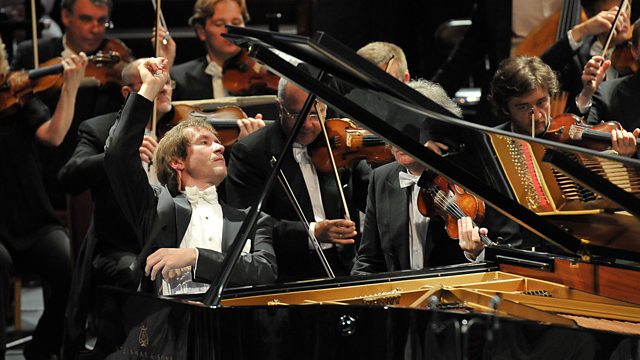
Rimsky-Korsakov’s Scheherazade
St. Petersburg Philharmonic, musicians from the composer’s home city, conducted by Yuri Temirkanov bring to London an authentic performance of Rimsky’s Scheherazade.
Rimsky-Korsakov: Scheherazade, Op. 35 (1888)
St Petersburg Philharmonic Orchestra
Yuri Temirkanov (conductor)
Russia’s oldest orchestra, formed six years before Rimsky’s Scheherazade was completed, dazzles London with the splendour and magic of a vivid symphonic tale. Inspired by some of the best known tales from Arabian Nights, the score has quickly become one of the best-loved works in the classical repertoire. �鶹��’s Verity Sharp is joined by the poet Imtiaz Dharker.
Picture credit: �鶹��/Christopher Christodoulou
Last on
More episodes
Next
Coming soon
More About the Music
Nikolai Andreyevich Rimsky-Korsakov (1844–1908)
Scheherazade, Op. 35��
In their final version, the four movements of Scheherazade have descriptive titles, such as The Sea and Sinbad's Ship or The Kalendar Prince but Rimsky insisted that he wasn’t trying to paint in music any specific scenes from the 1001 Nights. ��This collection of anonymous folk tales that sprang up among the Arabic speaking peoples in the ninth and tenth centuries, captivated both the West and Russia a millennium later. In fact, Rimsky originally wanted to give the individual four movements just technical titles such as ‘prelude’ but was persuaded that more specific clues would guide the listener’s imagination better.
In composing Shekherazada I mean these hints to direct but slightly the hearer’s fancy on the path which my own fancy had travelled, and to leave more minute and particular conceptions to the will and mood of each. All I had desired was that the hearer, if he liked my piece as symphonic music, would carry away the impression that it is beyond doubt an oriental narrative of some numerous and varied fairy-tale wonders and not merely four pieces played one after the other and composed on the basis of themes common to all the four movements. Why then, if that be the case, does my suite bear the name, precisely, of Shekherazada? Because this name and the title The Arabian Nights connote in everybody’s mind the East and fairy-tale wonders; besides, certain details of the music exposition hint at the fact that all of these are various tales of some one person (which happens to be Shekherazada) entertaining her stern husband.
From Rimsky: My Musical Life (translated by J. A. Joffe and edited by Carl van de Vechten)
Scheherazade achieved world-wide fame in 1910, when it was presented as a ballet by the legendary Ballets Russes in Paris, with a headline-grabbing story and leading dancers of the day, Vaslav Nijinsky and Ida Rubinstein, in title roles. But when the score is played as well as by the St. Petersburg musicians, it doesn’t need any visual aids: the most magical pictures are those it paints in your mind.
��
��
Broadcasts
- Sat 19 Sep 2015 18:06GMT�鶹�� World Service
- Sun 20 Sep 2015 11:06GMT�鶹�� World Service
